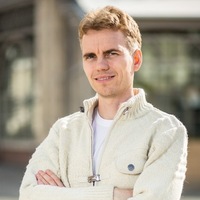Лампочка Эдисона.
Он ооочень много и очень долго делал неуспешные варианты лампочек.
Очень долго.
Многие на его месте бы бросили это дело.
Но он интуитивно ЧУВСТВОВАЛ, что это реально. Ага, ученый. Не на логику опирался, а на иррациональную интуицию. Знание из ниоткуда. Но знание точное. Логика часто не учитывает многого. А если интуитивный канал мощный, он даст верный ответ.
Многие не верят в свое чутье. Оно у всех и всегда поначалу ошибается часто. Но если упорно идти дальше, то % попадания растет.
Есть еще эффект постепенного раскрытия информации. Эдисон во всех своих неудачных попытках узнавал нечто. И с каждой лампочкой паззл постепенно складывался.
Сейчас гуру успешного успеха орут что легко и быстро после нашего семинара или видеолекции вы станете успешным. И нифига.
Паззл всегда открывается понемногу. И иногда лекции гуру срабатывают. Если инфа является недостающей частью паззла, который ты давно собирал. А для нулевого новичка это не сработает.
Еще есть соблазн держаться за один единственный пазлик, и не открывать другие. Это дает иллюзию своей экспертности и уверенность в себе. А другие варианты ломают эту иллюзию. Именно поэтому дилетанты часто орут - я знаю как надо. А продвинутые спецы вечно сомневаются, ведь они видят всю картину и много незаполненного.
Это и есть то самое "я прав", "я знаю как правильно" дилетанта. Профи чем больше узнает, тем глубже понимает, что еще большего не знает.
Дилетант очень туго развивается. Бегая по кругу своих знаний. Зато уверенности в себе море.
Вы видели Перельмана? Похож на уверенного в себе? А он смог то, что многие нет. Он даже не позводил себе получить награду, понимая СКОЛЬКО он еще НЕ знает.
Уверенность в себе - хорошая броня. Но тяжелая, не дающая двигаться. Оголенность и чуткость - хороший стимул роста, но высокая степень уязвимости. 2 крайности, между ними масса вариантов. И каждый выбирает свой.
Он ооочень много и очень долго делал неуспешные варианты лампочек.
Очень долго.
Многие на его месте бы бросили это дело.
Но он интуитивно ЧУВСТВОВАЛ, что это реально. Ага, ученый. Не на логику опирался, а на иррациональную интуицию. Знание из ниоткуда. Но знание точное. Логика часто не учитывает многого. А если интуитивный канал мощный, он даст верный ответ.
Многие не верят в свое чутье. Оно у всех и всегда поначалу ошибается часто. Но если упорно идти дальше, то % попадания растет.
Есть еще эффект постепенного раскрытия информации. Эдисон во всех своих неудачных попытках узнавал нечто. И с каждой лампочкой паззл постепенно складывался.
Сейчас гуру успешного успеха орут что легко и быстро после нашего семинара или видеолекции вы станете успешным. И нифига.
Паззл всегда открывается понемногу. И иногда лекции гуру срабатывают. Если инфа является недостающей частью паззла, который ты давно собирал. А для нулевого новичка это не сработает.
Еще есть соблазн держаться за один единственный пазлик, и не открывать другие. Это дает иллюзию своей экспертности и уверенность в себе. А другие варианты ломают эту иллюзию. Именно поэтому дилетанты часто орут - я знаю как надо. А продвинутые спецы вечно сомневаются, ведь они видят всю картину и много незаполненного.
Это и есть то самое "я прав", "я знаю как правильно" дилетанта. Профи чем больше узнает, тем глубже понимает, что еще большего не знает.
Дилетант очень туго развивается. Бегая по кругу своих знаний. Зато уверенности в себе море.
Вы видели Перельмана? Похож на уверенного в себе? А он смог то, что многие нет. Он даже не позводил себе получить награду, понимая СКОЛЬКО он еще НЕ знает.
Уверенность в себе - хорошая броня. Но тяжелая, не дающая двигаться. Оголенность и чуткость - хороший стимул роста, но высокая степень уязвимости. 2 крайности, между ними масса вариантов. И каждый выбирает свой.
Edison's light bulb.
He made unsuccessful versions of light bulbs for a very long time.
A very long time.
Many in his place would have dropped this case.
But he intuitively FELT that it was real. Yeah, scientist. He did not rely on logic, but on irrational intuition. Knowledge from nowhere. But the knowledge is accurate. Logic often leaves out a lot. And if the intuitive channel is powerful, it will give the right answer.
Many people don't believe in their instincts. Everyone has it and always at first makes mistakes often. But if you stubbornly go further, then the hit percentage grows.
There is also the effect of gradual disclosure of information. Edison, in all his failed attempts, recognized something. And with each light bulb, the puzzle gradually formed.
Now the gurus of successful success are yelling that easily and quickly after our seminar or video lecture you will become successful. And nifiga.
The puzzle always opens a little. And sometimes the guru's lectures work. If infa is the missing piece of the puzzle that you have been collecting for a long time. And for a zero beginner, it won't work.
There is also the temptation to hold on to one single puzzle and not open others. This gives the illusion of your expertise and self-confidence. And other options break this illusion. That is why amateurs often yell - I know how to do it. And advanced specialists always doubt, because they see the whole picture and a lot of unfilled things.
This is the very same "I am right", "I know how to do it right" by an amateur. The more he learns, the deeper he realizes that he doesn't know more.
The dilettante is developing very slowly. Running in the circle of my knowledge. But there is a lot of self-confidence.
Have you seen Perelman? Looks like confident? And he was able to do what many did not. He didn’t even allow himself to receive an award, realizing HOW MUCH he didn’t know yet.
Self-confidence is a good armor. But heavy, not allowing movement. Being naked and sensitive is a good growth driver, but a high degree of vulnerability. 2 extremes, between them a lot of options. And everyone chooses his own.
He made unsuccessful versions of light bulbs for a very long time.
A very long time.
Many in his place would have dropped this case.
But he intuitively FELT that it was real. Yeah, scientist. He did not rely on logic, but on irrational intuition. Knowledge from nowhere. But the knowledge is accurate. Logic often leaves out a lot. And if the intuitive channel is powerful, it will give the right answer.
Many people don't believe in their instincts. Everyone has it and always at first makes mistakes often. But if you stubbornly go further, then the hit percentage grows.
There is also the effect of gradual disclosure of information. Edison, in all his failed attempts, recognized something. And with each light bulb, the puzzle gradually formed.
Now the gurus of successful success are yelling that easily and quickly after our seminar or video lecture you will become successful. And nifiga.
The puzzle always opens a little. And sometimes the guru's lectures work. If infa is the missing piece of the puzzle that you have been collecting for a long time. And for a zero beginner, it won't work.
There is also the temptation to hold on to one single puzzle and not open others. This gives the illusion of your expertise and self-confidence. And other options break this illusion. That is why amateurs often yell - I know how to do it. And advanced specialists always doubt, because they see the whole picture and a lot of unfilled things.
This is the very same "I am right", "I know how to do it right" by an amateur. The more he learns, the deeper he realizes that he doesn't know more.
The dilettante is developing very slowly. Running in the circle of my knowledge. But there is a lot of self-confidence.
Have you seen Perelman? Looks like confident? And he was able to do what many did not. He didn’t even allow himself to receive an award, realizing HOW MUCH he didn’t know yet.
Self-confidence is a good armor. But heavy, not allowing movement. Being naked and sensitive is a good growth driver, but a high degree of vulnerability. 2 extremes, between them a lot of options. And everyone chooses his own.

У записи 22 лайков,
1 репостов,
727 просмотров.
1 репостов,
727 просмотров.
Эту запись оставил(а) на своей стене Владимир Клак











































